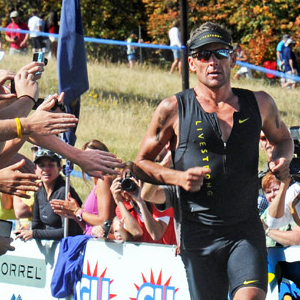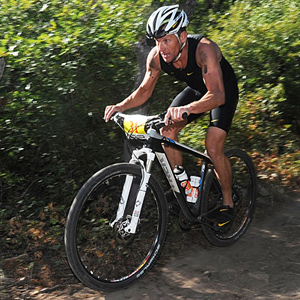Armstrong and USADA

If there is a time when the sport of triathlon needs an ombudsman—or at least a wise grandpa—today is it. As most know by now, USADA has commenced an investigation that could enjoin Lance Armstrong from competing in triathlon, stemming from doping allegations that stretch back into his career as a professional cyclist. The news was broken by the Washington Post.
How is the typical triathlon enthusiast supposed to feel about this? I'm not the sport's ombudsman, nor anyone's grandpa, nor even—depending on who you talk to—wise. But I'll give it a shot anyway.
What Lance Armstrong does in his fight against cancer is immaterial to his comportment as a professional athlete. People are not ethically monolithic. John F. Kennedy cheated on his wife and was true to his country. Richard M. Nixon was true to his wife and cheated on his country. It is possible for Lance Armstrong to be a saint and a sinner. Lord knows that describes most of us. Lance's fight against cancer does not earn him a get-out-of-jail-free card. He must complete the course. He must not draft. He must not litter. He must buckle his helmet (ahem!). And he must not dope.
I'm a process guy. If there is anything to American exceptionalism, it is this: We have an unusually admirable attachment to process. Imagine any other country in the world working through the presidential election of 2004 as seamlessly as this country did. We behaved so well because we are a country of laws, not men. Our processes trump our personalities.
If Lance is righteously popped, end of story. That's our process. We must abide by it, honor it, and live with it. Lance should be banned from triathlon for the requisite time period, and WTC should not make an exception in his case (not that it would).
Still, I think the onus is on USADA to lay out the case. I'd like to express here some things that bother me. Travis Tygart, who is USADA's front man and someone who we've interviewed here, is a lawyer by trade. Therefore, he knows the difference between evidence and rumor. According to today's Post article referenced above, the 15-page letter sent to Armstrong by USADA informing him of the investigation contains the allegation by "Martial Saugy, the director of an anti-doping lab in Switzerland, [who] stated that Armstrong's urine sample results from the 2001 Tour of Switzerland indicated EPO use." But the Post article further recounts an interview it conducted with Saugy last year, in which Saugy stated that the sample was merely "suspicious," and that "We did not do the additional analysis. It will never be sufficient to say, in fact, it was positive… I will never go in front of a court with that type of thing."
Three or four urban myths and phantom rumors does not equal one piece of admissible, actionable evidence. Tygart knows this or, if he’s forgotten, he needs to go back and audit that course in law school. In fact, I did not read anything in the Post article that constitutes evidence. The Post article references blood samples taken in 2009 and 2010 that were "fully consistent with blood manipulation including EPO use and/or blood transfusions." I’m left with this question: Were these samples found, by a WADA accredited lab, to be an adverse finding? Or, were these samples indicative of a bio passport anomaly? If so, that’s righteous evidence. But, this is 2012. Why are we hearing this now, rather than back when the violation took place?
In short—and in consideration of both claims above—if WADA's Code does not consider these as righteous, lawful evidence of doping infractions then (just as with the 1999 frozen urine samples allegedly demonstrating the presence of EPO), this isn't evidence. It doesn't exist. It never happened. Period. That's our process.
I'm bothered when rumors or hints are presented as evidence. Further, if you're the sort of person who's willing to present non-evidence as evidence, and I catch you at it, it invites my casting a jaundiced eye toward the rest of your case.
I hope Lance Armstrong decides to take this up with the Court of Arbitration for Sport, if the process ends in a ban, not because I’m a blind believer in the innocence of those whom I want to be innocent, rather because I’d like to see USADA’s claims subjected to a transparent airing in an adversarial setting.
If Lance Armstrong is guilty of doping in sport, I hope he’s banned. If he’s guilty and the only way to enforce a ban on him is through a bogus process, I hope he’s not banned, because then our process suffers. If he’s not guilty, then, he should enjoy the luxury of his rightful liberty to lead his life as he wishes, and we’ll enjoy the privilege of watching him race in the sport we love.
What’s more important than Lance Armstrong, and whether or not he took PEDs, are the processes to which we adhere. As a guardian of one such process, the onus is on Travis Tygart and his USADA organization to righteously, fairly, and transparently demonstrate to our racing community why he feels his organization’s action is warranted. Then it’s our responsibility to respond accordingly—which, yes, means honoring the ban—regardless of how we are predisposed toward Lance Armstrong. (CAS has earned my confidence, therefore I would consider a CAS verdict the final word.)
Just, let's remember that Lance Armstrong is not the only one bound by WADA's Code. USADA is not only a signatory to the Code, WADA and the USOC have bestowed upon USADA the job of sole defender in the United States of the Code. USADA cannot be opaque with its case against Armstrong, nor play fast and loose with the very Code its job is to enforce.
Late add: The letter sent to Lance Armstrong by USADA has been leaked to the internet. For those who want to read it, it's here.
[An earlier version of this opinion piece incorrectly stated that USADA "issued an immediate ban." This is untrue. USADA began a formal process that would result in an eventual ban. The only ban so far levied is a ban by WTC enjoining Armstrong from competing in its races, per the athlete agreement all its pro athletes must sign as a condition of competition.]





Start the discussion at forum.slowtwitch.com